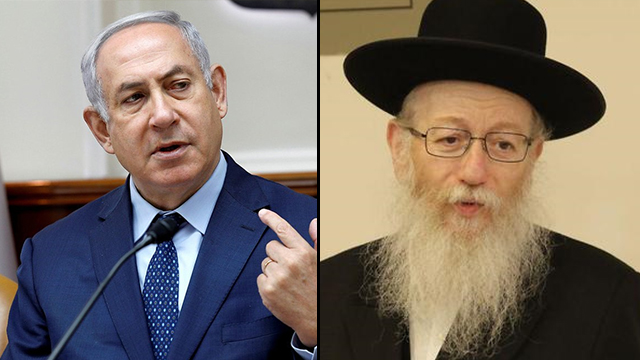

Litzman: If IDF draft bill crisis not resolved within a week, I'll resign
After his Council of Torah Sages instructed him to quit the government if no solution is found that would prevent the drafting of all ultra-Orthodox yeshiva students, the deputy health minister gives the state a week to get extension from High Court to resolve issue.
The existing Israeli Defense Service Law expires in September after the High Court deemed it unconstitutional, and so the Knesset must pass an alternative law before then.
If a new law is not passed to regulate the exemptions of ultra-Orthodox yeshiva students, tens of thousands of them are expected to receive IDF draft orders.
Litzman's close associates stressed he wasn't threatening Prime Minister Benjamin Netanyahu or the High Court, but rather acting at the instruction of his Agudat Yisrael faction's Council of Torah Sages, who determined a solution must be found before the end of the Knesset's summer session to prevent the drafting of yeshiva students.
"If the matter is not resolved, meaning if we don't get a postponement from the High Court, he would not be able to remain in the government," one close associate explained.
Prime Minister Netanyahu stressed Sunday that the new IDF draft bill was at the top of the coalition's priorities, expressing hope it can be passed in the current Knesset session, which ends next week.
"We will have a meeting with the heads of the coalition today about the draft bill," he told a meeting of Likud ministers. "We will try to square the circle and bring this to an end as soon as possible. That is the main effort."
But coalition officials said a solution will likely not be reached by the end of the summer session due to the objection of the Haredi parties, who have been vehemently against the current version of the legislation, formulated by the Defense Ministry. Because of that, Netanyahu will likely have no choice but to turn to the High Court and ask for an extension.
The proposed legislation, which passed its first reading in the Knesset last week, includes planned cuts to the yeshivot's budgets and the use of economic incentives to pressure the Torah study institutions to encourage enlistment, but no criminal sanctions.
The enlistment objectives, as stated in the proposal, are that 3,000 yeshiva students will be drafted in the first stage and 600 will volunteer for national service. These quotas are almost identical to the existing enlistment quotas that exist now.
The plan will be given a two-year adaptation period, in which sanctions won’t be imposed if the yeshivot fail to meet the draft rates. In the third year, yeshivot who fail to encourage enlistment will be hit with economic sanctions if they drop below a 95-percent target.
















